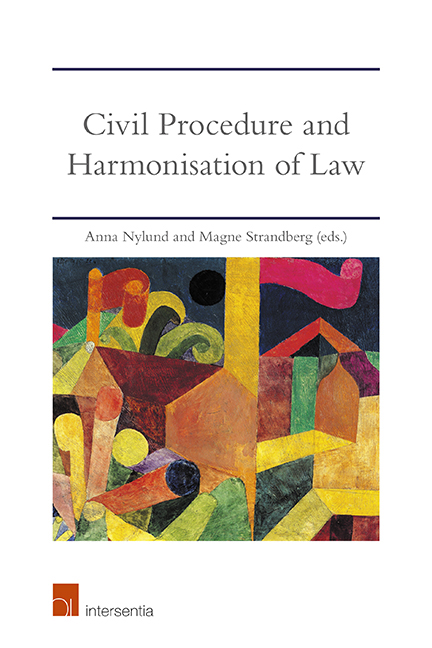Book contents
- Frontmatter
- Preface
- Contents
- List of Contributors
- List of Abbreviations
- Introduction
- EU Civil Justice at the Harmonisation Crossroads?
- The ELI-UNIDROIT Project: An Introduction and an English Perspective
- Europeanisation of Civil Procedure: Overcoming Follow-Up Fragmentation through Bottom-Up Harmonisation?
- Harmonisation or Fragmentation of National Law? An East Nordic Perspective
- An Examination of the Influence of European Union Law on English Civil Procedure
- The EU's Influence on Norwegian Civil Procedure through National Substantive Law
- Consumer Protection and EU-Driven Judicial Activism in the Netherlands
- The Role of the Judge in Consumer Cases – A German Perspective
- Ex Officio Application of the Unfair Terms Directive Cases against Consumers: A Swedish Perspective
- Ex Officio Application of EU Consumer Protection Law in Norwegian Courts
- Maintenance and Multi-Level Harmonisation: A European Union Perspective
- Family Maintenance and Multi-Speed Integration: A Norwegian Perspective
- Conclusions on Civil Procedure and Harmonisation of Law
- About the Editors
Maintenance and Multi-Level Harmonisation: A European Union Perspective
Published online by Cambridge University Press: 30 March 2019
- Frontmatter
- Preface
- Contents
- List of Contributors
- List of Abbreviations
- Introduction
- EU Civil Justice at the Harmonisation Crossroads?
- The ELI-UNIDROIT Project: An Introduction and an English Perspective
- Europeanisation of Civil Procedure: Overcoming Follow-Up Fragmentation through Bottom-Up Harmonisation?
- Harmonisation or Fragmentation of National Law? An East Nordic Perspective
- An Examination of the Influence of European Union Law on English Civil Procedure
- The EU's Influence on Norwegian Civil Procedure through National Substantive Law
- Consumer Protection and EU-Driven Judicial Activism in the Netherlands
- The Role of the Judge in Consumer Cases – A German Perspective
- Ex Officio Application of the Unfair Terms Directive Cases against Consumers: A Swedish Perspective
- Ex Officio Application of EU Consumer Protection Law in Norwegian Courts
- Maintenance and Multi-Level Harmonisation: A European Union Perspective
- Family Maintenance and Multi-Speed Integration: A Norwegian Perspective
- Conclusions on Civil Procedure and Harmonisation of Law
- About the Editors
Summary
CROSS-BORDER MAINTENANCE CASES WITHIN AND OUTSIDE THE EU
Family law issues are oft en seen as being culturally more sensitive than other areas of the law and, therefore, less apt for harmonisation either within the EU or on an international level outside of it. However, family law cases in general, and maintenance cases in particular, are becoming more and more transnational due to the increasing mobility of people. Despite the diversity of national laws on family maintenance and its cultural sensitivity, the need for coherent rules in cross-border maintenance cases and international co-operation has been recognised since the 1950s by the UN and the Hague Conference on Private International Law (Hague Conference).
The EU, on the other hand, did not pay much attention, generally speaking, to the field of family law, or to family maintenance in particular, for a long time, even where it had the power to legislate, namely in relation to cross-border cases in the field of international civil procedure and private international law. The old Brussels I regime and most of its accompanying instruments, as well as the Lugano Conventions, do cover maintenance cases, but apart from a special rule on jurisdiction, these instruments do not take into account the vulnerable situation of the maintenance creditor and the ‘need for speed’ in these cases. Moreover, they do not address international co-operation as a means to provide support, but instead leave this completely to the 1956 New York Convention.
This old system is now being replaced by a new system. The EU, with its Tampere program of 1999, set out to simplify and accelerate, inter alia, maintenance proceedings. As the Hague Conference also planned to overhaul their conventions on maintenance, both projects were being worked on in a co-ordinated manner. It helped that the EU as such had become a member of the Hague Conference. The EU now is a party to the two new Hague instruments of 2007 dealing with international maintenance cases, and enacted the EU Maintenance Regulation in 2009 for maintenance cases inside the EU. Together, these instruments make up a new system for cross-border maintenance cases within and outside of the EU. Consequently, the new Brussels I bis Regulation, by virtue of its Article 1 (2) (e), does not cover maintenance cases anymore.
- Type
- Chapter
- Information
- Civil Procedure and Harmonisation of LawThe Dynamics of EU and International Treaties, pp. 193 - 208Publisher: IntersentiaPrint publication year: 2019



